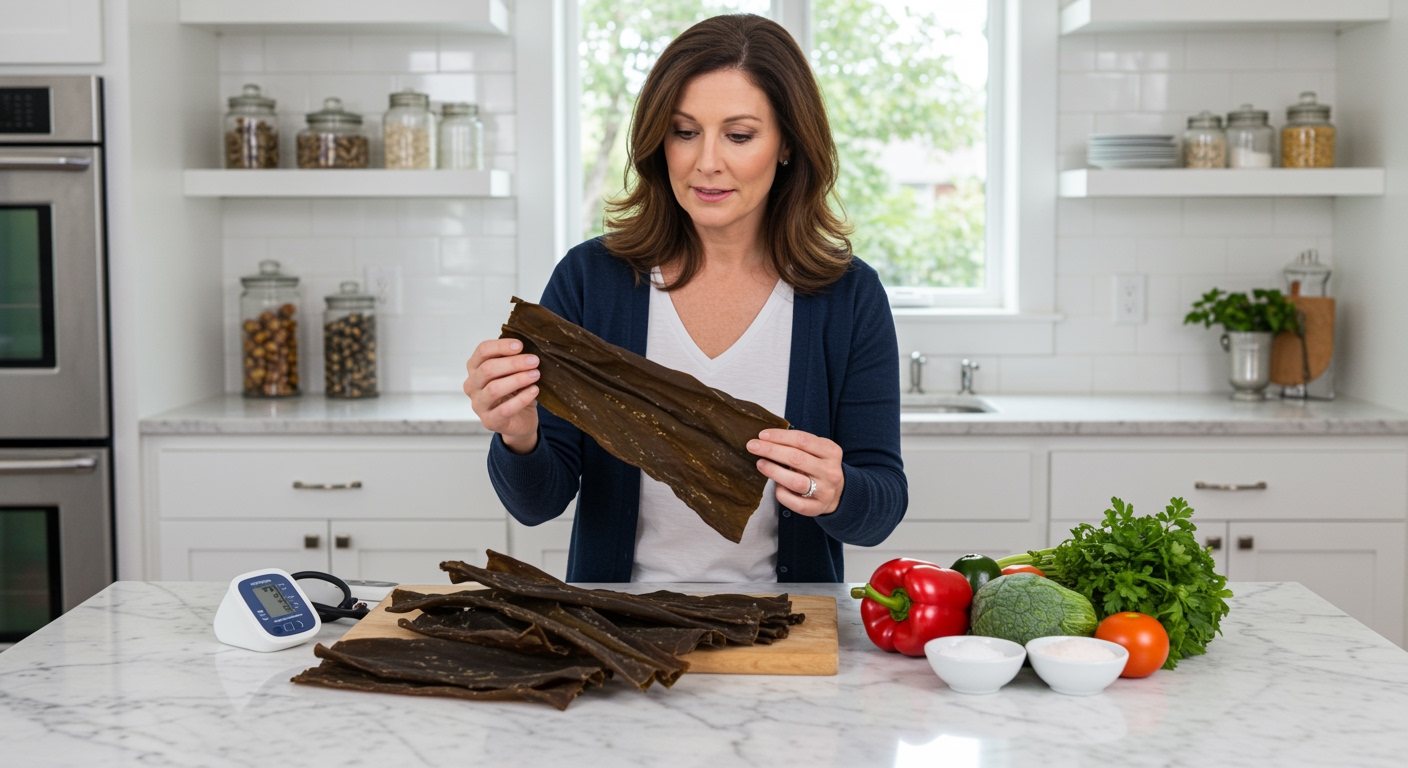✪ Key Takeaway: Kombu contains potassium and bioactive compounds that may help lower blood pressure naturally.
Introduction
Japanese people consume more seaweed than anyone else in the world, yet they have some of the lowest blood pressure rates globally.
You might be wondering if there is a connection between eating kombu seaweed and maintaining healthy blood pressure levels.
Hi, I am Abdur, your nutrition coach and today I am going to explain how kombu seaweed affects blood pressure and whether it can be part of your heart-healthy eating plan.
What Makes Kombu Special for Blood Pressure?
Kombu is a brown seaweed that grows in cold ocean waters around Japan and Korea.
This sea vegetable contains an impressive amount of potassium, which is crucial for blood pressure regulation.
One serving of dried kombu provides about 2,400 milligrams of potassium, which is more than half of your daily needs.
Potassium works by helping your kidneys remove excess sodium from your bloodstream through urine.
When sodium levels drop, your blood vessels can relax, and your blood pressure naturally decreases.
Kombu also contains unique compounds called fucoidans, which are sulfated polysaccharides that may have additional cardiovascular benefits.
✪ Fact: Kombu contains 10 times more potassium than bananas per serving.
How Does Kombu Affect Your Cardiovascular System?
Research shows that regular seaweed consumption may help improve several cardiovascular markers beyond just blood pressure.
The bioactive compounds in kombu can help reduce inflammation in your blood vessels, which is a major contributor to hypertension.
Studies indicate that people who eat seaweed regularly have lower levels of C-reactive protein, a marker of systemic inflammation.
Kombu also contains magnesium, which helps your blood vessels stay flexible and responsive to changes in blood flow.
The fiber in kombu may help lower cholesterol levels by binding to bile acids in your digestive system.
When your body needs to replace these bile acids, it uses cholesterol from your bloodstream, which can help improve your overall heart health.
✪ Pro Tip: Soak kombu in water for 30 minutes before cooking to maximize nutrient absorption.
What Does the Research Say About Kombu and Blood Pressure?
Several studies have examined the relationship between seaweed consumption and blood pressure control.
A study published in the journal Nutrition Research found that people who ate seaweed regularly had significantly lower systolic and diastolic blood pressure readings.
The researchers attributed these benefits to the high potassium content and bioactive compounds found in various seaweed species, including kombu.
Another research study showed that fucoidan compounds from brown seaweeds like kombu may help improve endothelial function.
Your endothelium is the inner lining of your blood vessels, and when it functions properly, your vessels can dilate and constrict as needed to maintain healthy blood pressure.
However, most studies have been conducted on Asian populations who consume seaweed as part of their traditional diet, so more research is needed to confirm these benefits in other populations.
✪ Note: Individual results may vary based on overall diet quality and lifestyle factors.
Are There Any Concerns About Eating Kombu?
While kombu offers potential benefits for blood pressure, there are some important considerations to keep in mind.
Kombu is extremely high in iodine, containing up to 2,000 micrograms per serving, which is more than 10 times the recommended daily intake.
Excessive iodine intake can interfere with thyroid function and may cause hyperthyroidism or hypothyroidism in sensitive individuals.
People taking blood pressure medications should consult their healthcare provider before adding kombu to their diet, as the potassium content may interact with certain medications.
Kombu also contains natural sodium, though much less than processed foods, so portion control is still important.
If you have kidney disease, you should avoid kombu entirely due to its high potassium content, which your kidneys may not be able to process effectively.
✪ Pro Tip: Start with small amounts of kombu to assess your tolerance before increasing intake.
How Should You Include Kombu in Your Diet?
The safest approach is to use kombu as a flavor enhancer rather than eating large quantities directly.
You can add a small piece of dried kombu to soups, stews, or rice while cooking to infuse the dish with umami flavor and beneficial compounds.
Remove the kombu before serving to limit your iodine intake while still getting some of the potassium and other nutrients.
Making kombu dashi, a traditional Japanese broth, is another excellent way to incorporate this seaweed into your meals without overconsumption.
Limit your kombu consumption to no more than one small piece (about 5 grams) per week to avoid iodine toxicity.
Remember that kombu works best as part of an overall heart-healthy diet that includes plenty of vegetables, fruits, whole grains, and lean proteins.
✪ Fact: Traditional Japanese cooking uses kombu primarily for flavoring, not as a main ingredient.
The Bottom Line
Kombu seaweed contains potassium and bioactive compounds that may help support healthy blood pressure levels when used appropriately.
The key to good health is not finding magic foods but creating sustainable eating patterns that nourish your body consistently.
I would love to hear about your experiences with kombu or any questions you might have about incorporating sea vegetables into your diet, so please share your thoughts in the comments below.
References
At NutritionCrown, we use quality and credible sources to ensure our content is accurate and trustworthy. Below are the sources referenced in creating this article:
- PMC: Seaweed and human health
- Frontiers in Nutrition: Health Benefits of Seaweed Consumption
- J-STAGE: Functional Properties of Seaweed





